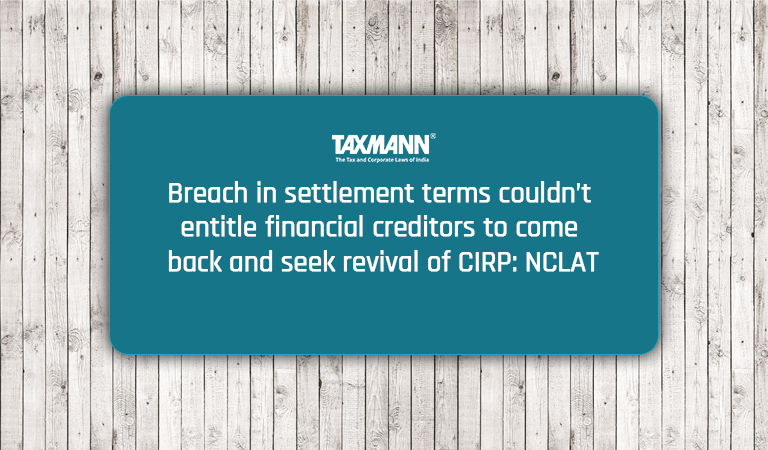Breach in settlement terms couldn’t entitle financial creditors to come back and seek revival of CIRP: NCLAT
- Blog|News|Insolvency and Bankruptcy Code|
- 2 Min Read
- By Taxmann
- |
- Last Updated on 18 September, 2021

Case details: Krishna Garg v. Pioneer Fabricators (P.) Ltd. - [2021] 130 taxmann.com 127 (NCLAT- New Delhi)
Judiciary and Counsel Details
-
- Justice Bansi Lal Bhat, Actg. Chairperson Dr. Ashok Kumar Mishra and Dr. Alok Srivastava, Technical Member
- Sanchit Garga, Adv. for the Appellant.
Facts of the Case
The Appellants-financial creditors filed a Corporate Insolvency Resolution Process (CIRP) against the corporate debtor in this case. The CIRP began with the appointment of an IRP and the imposition of a moratorium.
However, the parties reached an agreement, as a result of which appellants got some post-dated cheques. The CIRP was ended after the Adjudicating Authority permitted the appellants to drop their claim.
Following that, the appellants filed an application for CIRP resurrection, claiming that the corporate debtor had failed to comply with the settlement provisions. The Adjudicating Authority denied the application in the challenged ruling.
NCLAT Held
The NCLAT stated that the settlement terms were neither filed nor brought to the attention of the Adjudicating Authority; however, it was incorporated in an order of the Adjudicating Authority that, with the power to revive/restore CIRP in the event of a corporate debtor not adhering to the terms of settlement or post-dated cheques issued to appellants being dishonored.
From the aforesaid, it could not be said that settlement terms not incorporated in the order of Adjudicating Authority, such terms would not assume the character of a decree of Court and breach thereof would not entitle the financial creditor to come back and seek revival of CIRP.
Case Review
-
- Smt. Krishna Garg v. Pioneer Fabricators (P.) Ltd. [2021] 130 taxmann.com 126 (NCLT – New Delhi) (para 3) affirmed.
List of Cases Referred to
-
- Swiss Ribbons (P.) Ltd. v. Union of India [2019] 101 taxmann.com 389/152 SCL 365 (SC) (para 2).
Disclaimer: The content/information published on the website is only for general information of the user and shall not be construed as legal advice. While the Taxmann has exercised reasonable efforts to ensure the veracity of information/content published, Taxmann shall be under no liability in any manner whatsoever for incorrect information, if any.

Taxmann Publications has a dedicated in-house Research & Editorial Team. This team consists of a team of Chartered Accountants, Company Secretaries, and Lawyers. This team works under the guidance and supervision of editor-in-chief Mr Rakesh Bhargava.
The Research and Editorial Team is responsible for developing reliable and accurate content for the readers. The team follows the six-sigma approach to achieve the benchmark of zero error in its publications and research platforms. The team ensures that the following publication guidelines are thoroughly followed while developing the content:
- The statutory material is obtained only from the authorized and reliable sources
- All the latest developments in the judicial and legislative fields are covered
- Prepare the analytical write-ups on current, controversial, and important issues to help the readers to understand the concept and its implications
- Every content published by Taxmann is complete, accurate and lucid
- All evidence-based statements are supported with proper reference to Section, Circular No., Notification No. or citations
- The golden rules of grammar, style and consistency are thoroughly followed
- Font and size that’s easy to read and remain consistent across all imprint and digital publications are applied



 CA | CS | CMA
CA | CS | CMA
